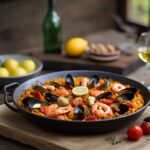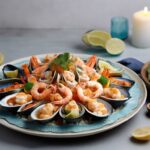Culinary arts, throughout the centuries, have witnessed a unique metamorphosis, an evolution forged by the brilliant minds and exceptional skills of the great masters of the kitchen. These innovative visionaries have not only cooked exceptional dishes but have also left an indelible mark on the very fabric of gastronomy. Their creativity, skill, and undeniable influence are woven into the techniques, ingredients, and presentations that we now consider fundamental to modern cuisine.
In the pages of this article, we will embark on a fascinating journey through the eras, unraveling the significant contributions of some of the most prominent kitchen masters. We will discover how, throughout history, they have left their unique imprint, transforming not only the way we prepare and enjoy food but also the culture surrounding gastronomy.
By exploring the culinary feats of these visionary leaders, we will draw back the curtain hiding the secrets behind the evolution of cuisine. From the refined salons of Auguste Escoffier to the innovative laboratories of Ferran Adrià, each master has contributed an essential piece to the culinary puzzle we enjoy today.
Thus, we will venture beyond recipes and techniques, delving into the very heart of the kitchen, where creativity meets innovation and skill merges with tradition. This article is a tribute to those who, with their culinary achievements, have shaped the gastronomic landscape, marking a milestone in the history of food that will resonate for generations to come. Join us on this journey to discover the invaluable contributions of the great masters of the kitchen!
Auguste Escoffier and the Revolution of Haute Cuisine
Auguste Escoffier, a name resonating through the halls of culinary history, stands as a cornerstone in the evolution of cuisine. In 19th-century Paris, Escoffier not only excelled as an exceptional chef but transcended his role to radically transform the structure and organization of kitchens worldwide.
Organization as a Cornerstone:
Escoffier’s legacy lies in redefining kitchen organization. He introduced the revolutionary concept of the “kitchen brigade,” an organized hierarchy assigning specific roles to each member, optimizing efficiency and enabling the simultaneous preparation of multiple dishes. This approach, initially conceived at the Hotel Ritz in Paris, became the backbone of modern haute cuisine.
The Escoffier Code:
His famous book, “Le Guide Culinaire,” was not just a detailed cookbook but a compendium of culinary principles that set standards for classic French cuisine. This code, addressing everything from ingredient selection to presentation, became the definitive reference for chefs worldwide. Escoffier articulated not only how to cook but also how to elevate cooking to a refined art.
Elevation of Gastronomic Standards:
Escoffier’s influence extended beyond kitchen logistics; he also contributed to raising gastronomic standards. He introduced the notion of “haute cuisine,” marked by exquisite dishes, refined techniques, and elegant presentations. His emphasis on ingredient quality and perfection in execution has endured as a standard of excellence.
Lasting Legacy:
Today, in every kitchen following haute cuisine principles, homage is paid to Escoffier. His legacy is palpable in chef training, the organizational structure of high-end restaurants, and the continued veneration of classical cuisine. The “kitchen brigade” is a living tribute to his genius, and his teachings remain the foundation upon which contemporary culinary practices stand.
In summary, Auguste Escoffier was not only an exceptional culinary master but also a visionary architect who built the foundations of modern haute cuisine. His contribution, beyond recipes and techniques, is a lesson in how organization, precision, and dedication can transform a discipline, leaving an indelible mark on the rich history of gastronomy.
Julia Child and Popularizing French Cuisine in America
In the culinary landscape, few names evoke the same reverence and affection as Julia Child. Her influence transcends the culinary sphere; she was a trailblazer who opened the doors of French cuisine to the American public, marking a significant milestone in gastronomic history.
Julia’s Culinary Odyssey:
Julia Child’s culinary journey is a fascinating narrative of discovery and determination. Her introduction to French cuisine began during her stay in Paris, where she fell in love with the flavors, techniques, and sophistication of Gallic cooking. This experience planted the seed that would germinate into a lifelong devotion to French gastronomy.
Mastering the Art of French Cooking:
The milestone that catapulted Julia Child to fame was the publication of “Mastering the Art of French Cooking,” a monumental work co-authored with Simone Beck and Louisette Bertholle. This book was not only a comprehensive cookbook but also an instructional masterpiece that demystified French cooking for American readers. Julia transformed sophisticated dishes into something accessible for the home cook, fostering a new level of appreciation for French culinary arts.
Julia’s Television Show:
Julia Child brought her passion for cooking to television with her iconic show, “The French Chef.” Her laid-back approach and unique style attracted a massive audience, making her a beloved figure in American households. Through the screen, she taught not only recipes but also the joy and experimentation in the kitchen.
Julia’s Legacy:
Julia Child’s impact on American cuisine goes beyond recipes and television shows. Her legacy is reflected in a generation of chefs and culinary enthusiasts who consider her an inspiration. Julia democratized French cooking, breaking barriers and making haute cuisine accessible to everyone. Her influence extends to this day, where her joyful spirit and love for good food continue to inspire those venturing into the kitchen.
In conclusion, Julia Child not only popularized French cuisine in America but also left an indelible impact on how we conceive cooking and gastronomy. Her ability to make haute cuisine approachable and her passionate dedication to the culinary art make her a timeless figure who has left a lasting legacy in American gastronomic culture.
Ferran Adrià and Culinary Avant-Garde
At the forefront of culinary innovation, the name Ferran Adrià resonates as a beacon of creativity and experimentation. With his restaurant ElBulli, located on the Costa Brava in Spain, Adrià became the epicenter of the gastronomic revolution, challenging conventions and redefining the culinary experience.
ElBulli:
A Culinary Laboratory: ElBulli was not merely a restaurant; it was a culinary laboratory where Ferran Adrià and his team conducted experiments challenging traditional expectations. He introduced molecular gastronomy, an approach that used scientific techniques to transform ingredients in surprising ways. Foam, spherifications, and other innovative techniques emerged from this laboratory, marking a before and after in contemporary gastronomy.
Unlimited Creativity:
Adrià’s cuisine was synonymous with unrestricted creativity. Each dish was a work of art, a multisensory experience challenging traditional perceptions. From presentation to unexpected textures, each element was meticulously thought out to surprise and captivate diners.
Global Impact:
ElBulli not only garnered acclaim but became a global phenomenon. Securing a reservation at this restaurant was an achievement, and chefs worldwide were inspired by Adrià’s audacity. His experimental approach not only influenced high-end kitchens but also permeated popular culinary culture, where innovation and attention to detail were appreciated.
Sustainability and Legacy:
In addition to his culinary innovation, Ferran Adrià also advocated for sustainability and social responsibility in gastronomy. After closing ElBulli, he dedicated himself to educational projects and the ElBulli Foundation, promoting research and creativity in gastronomy. His legacy extends beyond creations on the plate; it is a call to constant exploration and responsibility in the culinary industry.
Reflection in Modern Cuisine:
Today, Ferran Adrià’s influence is found in restaurants worldwide. Molecular gastronomy has become a field of study in its own right, and the idea of cooking as an art form has taken root in modern culinary culture. Contemporary chefs continue to explore new frontiers, inspired by Ferran Adrià’s courage and vision.
In conclusion, Ferran Adrià is a visionary whose avant-garde cuisine has left an indelible mark on the history of gastronomy. His legacy resides not only in innovative dishes but in the mindset that triggered a revolution in how we understand, experience, and appreciate food. Modern cuisine owes much to the boldness and creativity of Ferran Adrià.
René Redzepi and the Nordic Revolution
In the contemporary culinary world, few have left as deep a mark as René Redzepi, the visionary behind the restaurant Noma in Copenhagen, Denmark. His revolutionary approach to Nordic cuisine has changed not only the perception of Scandinavian gastronomy but also how we understand the relationship between ingredients, nature, and sustainability.
Culmination at Noma:
Noma was not just a restaurant; it was a catalyst for the Nordic Revolution in cuisine. René Redzepi and his team not only celebrated local ingredients but also transformed the notion of what they could be. Redzepi explored and rescued indigenous, often overlooked ingredients, creating dishes that were a unique manifestation of the region.
Sustainability and Seasons:
Redzepi’s commitment to sustainability and seasonality became a fundamental pillar of his cuisine. At Noma, each dish reflected the season and the abundance of ingredients at that specific time. This connection with nature not only highlighted the freshness of the food but also fostered a deeper appreciation for the environment and its cycles.
Influence of New Nordic Cuisine:
The movement that emerged from René Redzepi’s kitchen is known as New Nordic Cuisine. This approach not only transformed the gastronomic scene in Scandinavia but also resonated globally. The idea of celebrating and redefining cuisine based on local and seasonal ingredients became a paradigm that inspired chefs worldwide.
Exploration and Creativity:
Redzepi is known for his exploratory and creative approach to cooking. His team has embarked on expeditions in nature to discover new ingredients and culinary techniques. This sense of adventure not only drove innovation at Noma but also inspired a new mindset in gastronomy, encouraging chefs to look beyond traditional boundaries.
René Redzepi’s Legacy:
René Redzepi’s legacy transcends the borders of Noma. His emphasis on connecting with the land and the season, as well as his dedication to sustainability, has left a lasting mark on how we perceive and practice cooking today. In addition to Noma, Redzepi has influenced educational projects and the MAD Foundation, addressing critical issues in the food industry.
In summary, René Redzepi has led the Nordic Revolution, redefining cuisine and showing the world the wonders of local and seasonal ingredients. His legacy is not only in the dishes served at Noma but in the transformative mindset he has inspired in global gastronomy.
Anthony Bourdain and Global Culinary Exploration
Anthony Bourdain was much more than a chef and television host; he was a fearless storyteller who took millions of viewers on a global journey through food, culture, and culinary diversity. His influence endures not only in the kitchen but also in how we understand and appreciate the gastronomic richness of the world.
Traveler and Narrator:
The essence of Anthony Bourdain lay in his ability to be an tireless traveler and a passionate narrator. Through his show “Parts Unknown” and his books, Bourdain explored remote corners of the world, taking viewers on culinary journeys that transcended the boundaries of gastronomy to delve into the cultural and social essence of each place.
Breaking Cultural Barriers:
Bourdain stood out for breaking cultural barriers through food. By tasting local dishes, sitting at family tables, and sharing experiences with people of diverse backgrounds, he showed the universal connection that food creates among people. His humane and respectful approach to various culinary traditions spurred a global dialogue on the importance of food diversity.
Exploration of Authenticity:
Throughout his journeys, Bourdain sought authenticity in both food and the people preparing it. His honest and unpretentious approach resonated with the audience, highlighting the beauty of simple and genuine culinary experiences. Bourdain appreciated a street vendor in Vietnam as much as an elegant dinner in Paris, always seeking authenticity and personal connection.
Challenging Perspectives:
Anthony Bourdain challenged conventional perspectives on food and culture. He often ventured off the beaten path to explore lesser-known aspects of a region, showing that authenticity is not always found in conventional tourist destinations. His brave and unbiased approach to culinary diversity expanded the horizons of those who followed him.
Legacy and Social Commitment:
Tragically, Anthony Bourdain left us in 2018, but his legacy persists. His social commitment and advocacy for equality and justice in the food industry continue to inspire chefs and food enthusiasts. Bourdain left an indelible mark on culinary culture, reminding us that food is a means for connection, understanding, and celebrating our shared humanity.
In conclusion, Anthony Bourdain was a global culinary ambassador who explored the world through food and, in doing so, inspired us all to appreciate the culinary and cultural diversity that enriches our planet. His legacy lives on in the brave exploration of new experiences and in the belief that, through food, we can find meaningful connections among people from all corners of the world.
Conclusion
The great masters of the kitchen have left a lasting legacy that goes beyond recipes and techniques. Their contributions have shaped the way we understand, appreciate, and enjoy food. By exploring their stories, we learn not only about the evolution of cuisine but also about the creativity, innovation, and passion that define the very essence of this ever-changing art form. Thus, we honor those whose skills and vision have contributed to the rich history of global gastronomy.
Explore our e-shop and take your culinary experience to the next level! At CookingLandia, we have carefully selected the finest kitchen utensils and products for you. From high-quality chef’s knives to durable cookware, and innovative culinary gadgets, you’ll find everything you need to equip your kitchen like a true professional. Discover our curated collection and choose the products that will make cooking even more exciting and efficient. Visit our e-shop now and turn every moment in the kitchen into an extraordinary experience! 🍳🔪🍴
More content
- Gastronomía egipcia: dieta y recetas ancestrales

- Comida Callejera en el Mundo: Historia y Platos Típicos

- Historia del Chocolate: De los Aztecas al Presente

- Culinary Globalization: Exploring 6 Iconic World Dishes

- Sustainable Dishes: Gastronomic Trends for a Greener Future

- The Most Impactful Gastronomic Trends Shaping the World

- Myths and Legends: The Magical Stories Behind Foods

- Symbolism of Food: The Meaning in Every Bite

- Iconic Dishes of Spanish Cuisine by Region

- Exploring Flavors: Top 10 Typical Dishes of Latin America

- Perfect Pairing: Wines and Dishes for Gastronomic Celebrations

- Title: Culinary Traditions in Festivals: Festive Flavors of the World

- Gastronomy and Folklore: Culinary Traditions and Local Myths

- Culinary Journey: Discovering Culinary Traditions from Different Cultures

- Healthy and Affordable Recipes: Eating Well Without Spending Much

- Healthy Breakfasts: 7 Nutritious Recipes for the Whole Week

- Probiotic Foods: How Do They Improve Your Digestive Health?

- Boost Your Immune System: The Best 10 Foods

- 6 Healthy Recipes for a Balanced and Delicious Diet

- 15 Foods to Maintain a Balanced and Nutritious Diet

- Menus for Allergen-Free Diets: The Best Recipes and Nutritional Strategies

- Dietary Plans for Food Allergies: Top 10 Tips and Recommendations

- Low-Carb Diets: Top 10 Recommended Foods

- Low-Carb Diet: A Beginner’s Guide

- Easy Gluten-Free Recipes for Every Day of the Week

- Complete Guide to Gluten-Free Diets: Tips for Beginners

- Protein Sources in a Vegan Diet: What to Do?

- Vegetarianism for Beginners: Simple Steps to Adopt This Lifestyle

- Taste the Best of Africa: Top 5 Iconic Regional Recipes

- The Secrets of African Cuisine: Traditional Recipes and Flavors

- 10 Latin American Sweets: Tempting Dessert Adventures Await

- Secrets of Latin American Cuisine: Traditional and Authentic Recipes You Must Try

- Taste of the Mediterranean: 5 Key Dishes

- Simple Mediterranean Cooking for Beginners: Impress Your Guests!

- Homemade Sushi: Simple Steps to Prepare Your Favorite Rolls

- Secrets of Asian Cuisine: Discovering 8 Traditional Techniques

- Innovation in Cuisine: Gourmet Products in Traditional Recipes

- The 10 Most Exclusive Gourmet Products You Must Try

- White Fish vs. Blue Fish: Which is Better for Your Health?

- The Secrets of Perfect Seafood Cooking: Kitchen Tricks

- How to Choose the Best Poultry for Your Recipes

- From Farm to Table: How to Select Quality Meat

- Complete Guide: Enhance Your Dishes with Fresh Herbs

- Revealing the Superfood Potential of Red Fruits: Benefits & Recipes

- Starting Out in the Kitchen: Pro Chef Tips for Beginners

- Unlock Your Culinary Potential: Beginner’s Guide to Essential Techniques

- Culinary Secrets Unveiled: Elevate Your Cooking with Simple Ingredient Tricks

- Master Your Kitchen: 10 Unexpected Tips for Easy Cooking

- Art of Fruit and Vegetable Cutting: Expert Techniques Revealed

- Efficiency Unleashed: Explore the Art of Mise en Place

- Mastering Healthy Cooking: Unveiling 4 Low-Fat Secrets

- Complete Guide to Cooking Methods: Everything You Need to Know

- From Fusion to Tradition: 4 Global Gastronomic Trends

- Culinary Innovations: The Most Impactful Gastronomic Trends

- A Gastronomic Journey: Migratory Influences in the Cuisine

- Flavors of the World: A Journey Through Diverse Culinary Influences

- The Evolution of Food: Traditional vs. Modern Cuisine Compared

- The Great Masters of Cuisine: Contributions to its Evolution

- Spices Through Time: Understanding Their Historical Importance

- 5 Great Gastronomic Moments: Historic Milestones in the Cuisine


